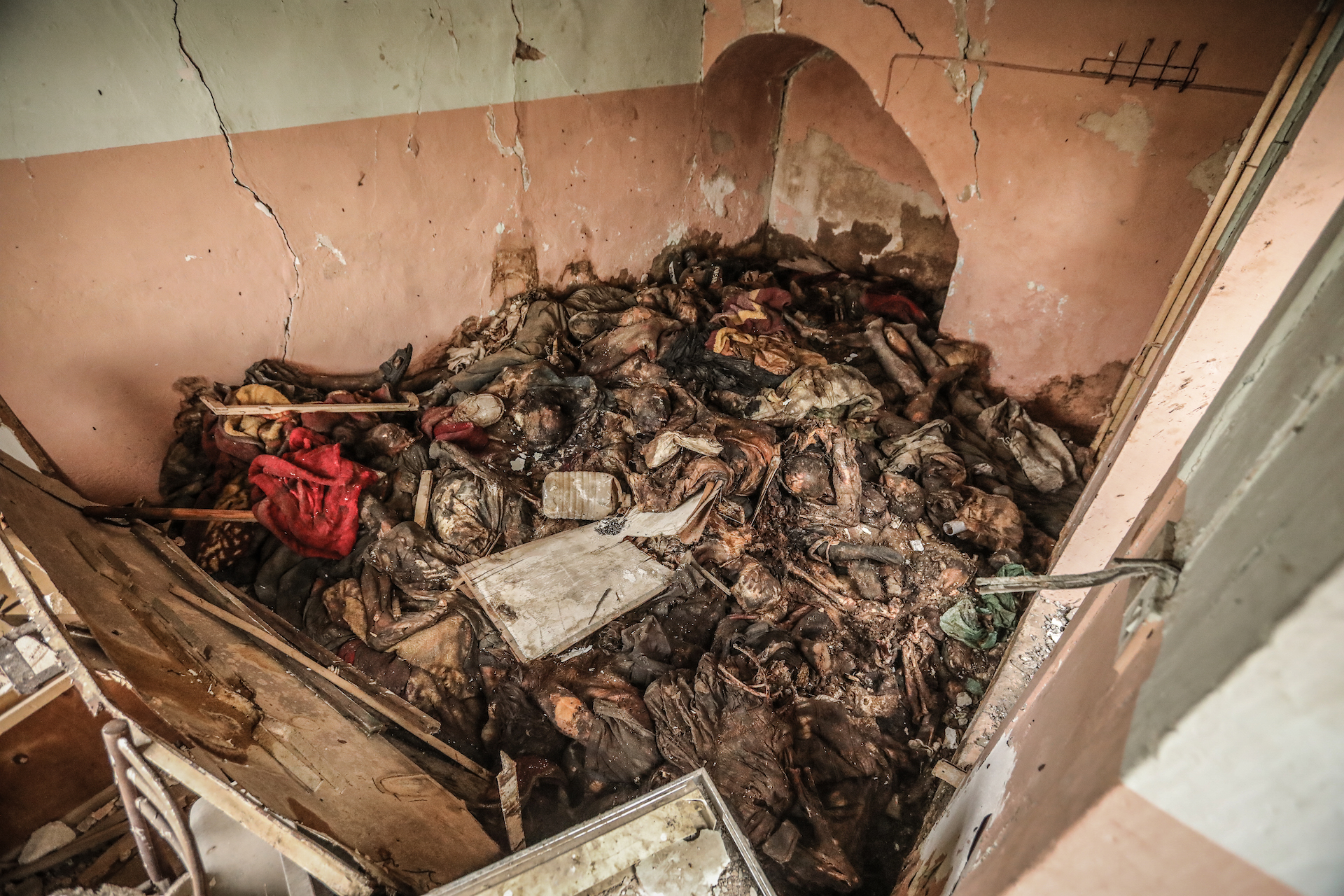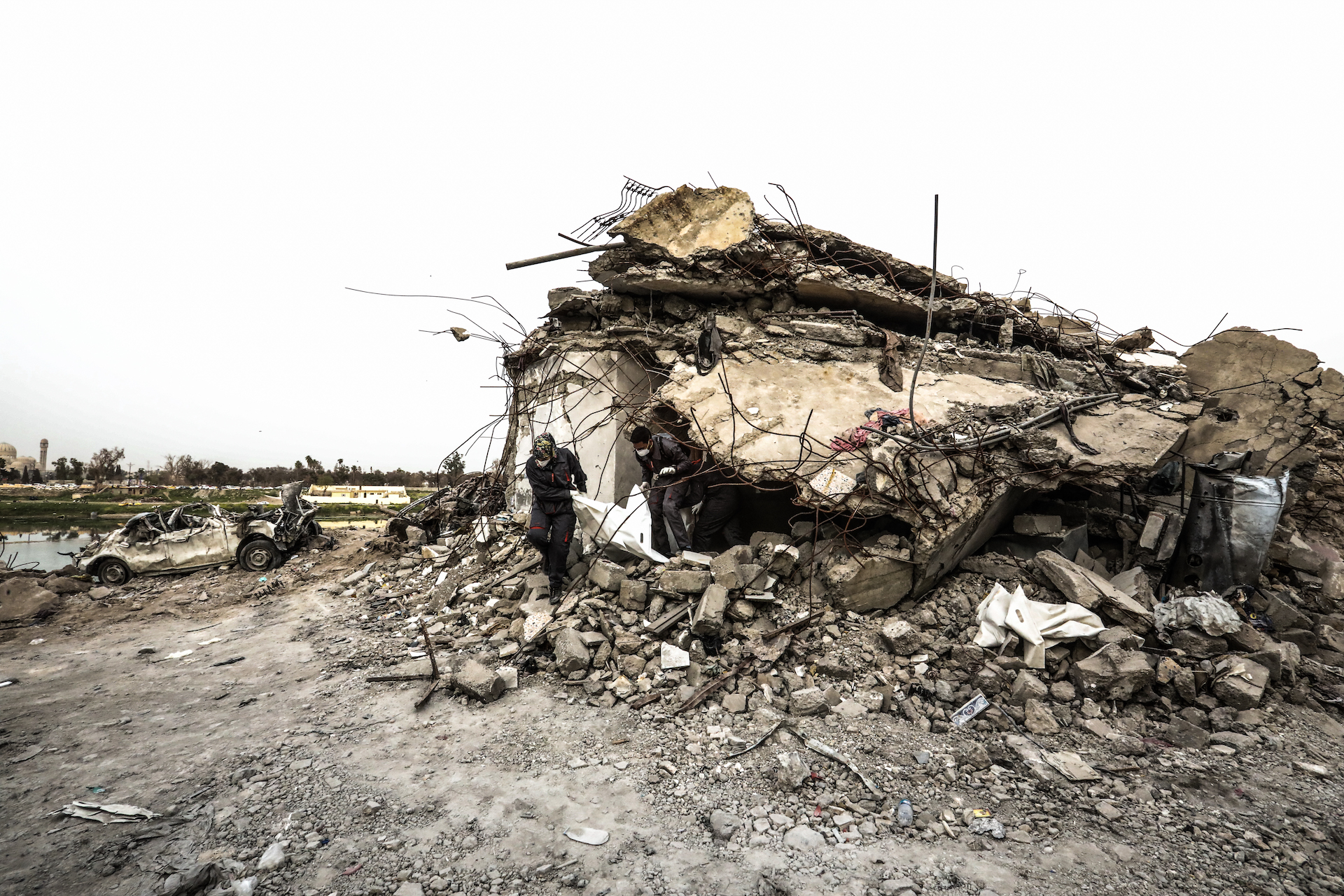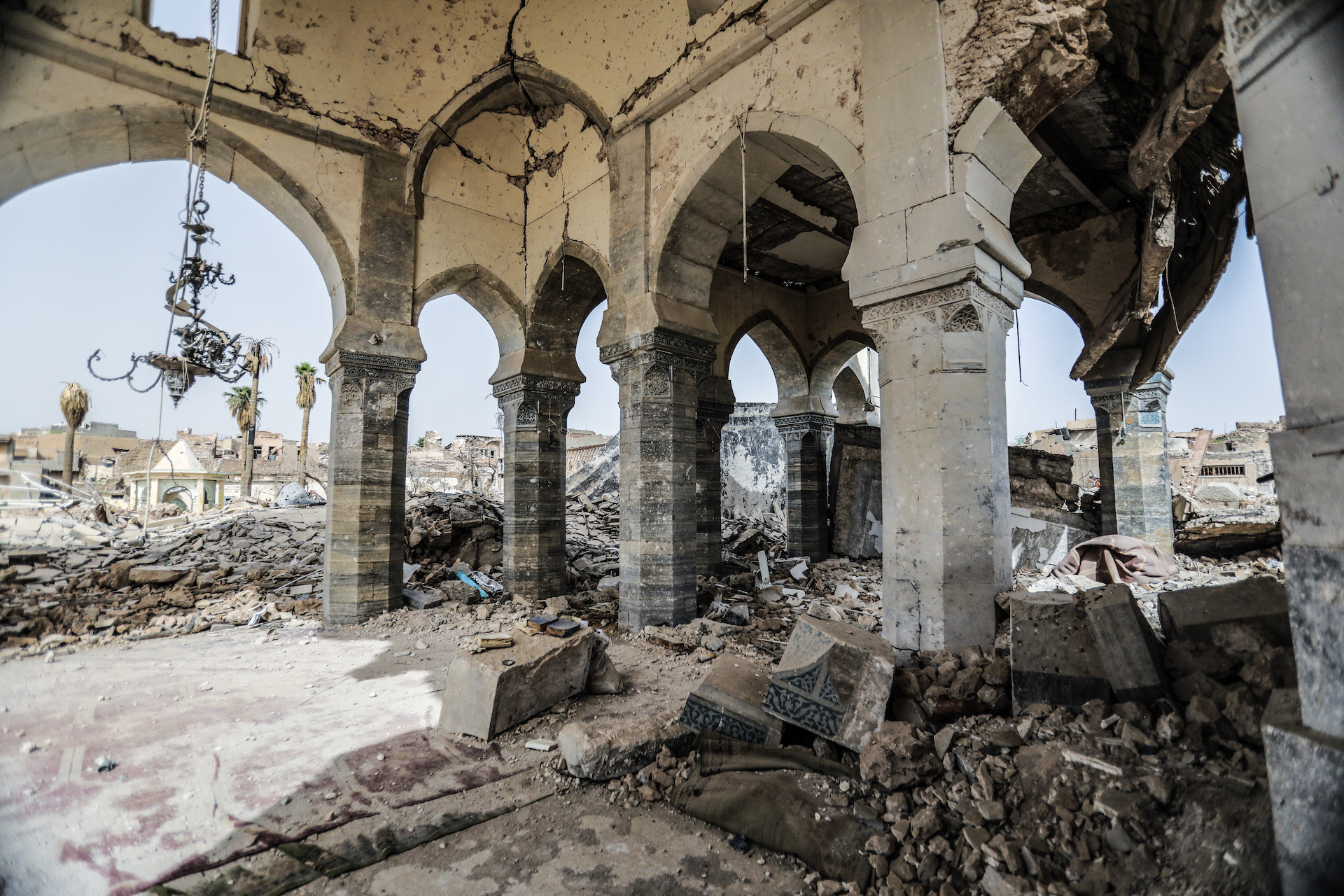Imagine the other cities in Iraq and Syria. Mosul was part of Assyria as early as the 25th century BC. Of note, in 2008, there was a sizeable exodus of Assyrian Christians. They sought sanctuary in Syria and Turkey due to threats of murder unless they converted to Islam.
Related reading: Aleppo: Tell Our Story After we are Gone
Inside the killing rooms of Mosul
Warning: Graphic images
MOSUL, Iraq — In March, VICE News returned to Mosul for the first time since the war against ISIS was declared over eight months ago.
While life may be returning to normal in the eastern half of the city, on the other side of the river — where the fighting was most intense — the scale of rebuilding that needs to be done is monumental. It’s estimated there are still 8 million tons of conflict debris that need to be moved before reconstruction can start, equivalent to three times the size of the Great Pyramid of Egypt. About 75 percent of that rubble is in West Mosul, and it’s mixed with so much unexploded ordnance that experts say this is now one of the most contaminated spots on the planet.
In the Old City, where ISIS made its last stand, residents have slowly started to come back – a few business owners hoping to repair shops, and families who have no other option but to live in their damaged homes. Some water tanks have been trucked in, and electricity cables have been temporarily patched together along some streets, but the place feels deserted, and in some ways the scene was not that different from how it looked shortly after the fighting.
Eight months on, there are hundreds or perhaps thousands of bodies still under the rubble, making life unbearable for the families who have returned.
The putrefied corpses are mainly Islamic State fighters or their families, since many of the non-ISIS civilian bodies have been dug out and reclaimed by family members or civil defense workers. The bodies that remain are a severe health hazard, but there’s little political will to deal with them, and removing them is risky given the unexploded munitions littering the area. Nevertheless, teams of citizen volunteers are going house-to-house carrying out this gruesome, dangerous work on a daily basis.
**
One volunteer team is led by Sroor al-Hosayni, a 23-year-old former nurse. Many of her group are even younger; some are medical students, but most have no formal training in handling corpses. So far, they say they’ve pulled and bagged more than 350 bodies that no one else was willing to deal with. They laid them in white plastic body bags where municipal trucks can easily collect them, labeling them for any potential explosives found with the corpse.
“We saw that there were bodies everywhere, in the alleys and inside the houses,” Hosayni said. “I took my team and started implementing this idea by going to help municipality and government workers in removing these bodies before summer comes and disease spreads in the city.”
At first the authorities complained, telling her: “‘You don’t have to move ISIS bodies. Leave them there; the dogs will eat them.”
Hosayni replied, “But one or two dogs can’t eat them; there are thousands of bodies.”
After filming Hosayni’s team at work near the destroyed Al Nuri mosque, we followed them to Al Maydan — the Old City neighborhood where ISIS made its last stand — where they had been working on one particular site for weeks.
Bulldozers have started clearing a path where Souk Al-Samak Street once ran along the river, but almost nothing else has changed since the air bombardment flattened this district.
The ruins of arched and intricately carved stone doorways open onto inner courtyards like dioramas of the war, frozen in time: Human corpses in varying degrees of decay lying amid stray ordnance, broken china, plastic toy trucks, and discarded military apparel.
Two hundred yards up the street and on the right, the team pointed us to a building on the banks of the Tigris River. Scrambling through the collapsed masonry, we emerged into two mostly intact basement rooms with barred windows looking out onto the river. In the far room, buzzing with flies and inescapable stench, were dozens and dozens of corpses, stacked too deep to count, one on top of another. It seemed to be the remains of a mass execution.
The body collectors told us there were at least 100 bodies in here; the team had already cleared more than 30 but had barely made a dent in the mound of corpses.
We saw what appeared to be the bodies of children, though it was difficult to verify given the level of decay. We saw no weapons or military gear on the bodies. The team told us they could see bullet wounds to their heads.
There are reports that ISIS locked large numbers of people in rooms like this, using them as human shields during the final days of the conflict. Many of those families died in coalition airstrikes — but this room was intact. It’s possible they could have been executed by ISIS fighters as government forces closed in. But it’s not clear why ISIS would kill or dispose of civilians in this way.
There are also reports of Iraqi forces executing captured ISIS members in this exact neighborhood. Beards and long hair were still visible on some of the corpses, leading the body collectors to believe some could be men who may have been affiliated with ISIS. But speaking to VICE, a senior Iraqi military official rejected any notion that Iraqi forces may have been responsible for the killings and told us that the site had already been investigated, without providing further details.
One international organization that has documented instances where Iraqi security forces have been accused of carrying out executions is Human Rights Watch.
Belkis Wille, the lead Iraq investigator at Human Rights Watch, visited the site soon after we did. She told us she was unaware of any investigation having been done at this particular site, and that — whoever was responsible for the deaths — the removal of evidence was troubling given that this was potentially the site of a war crime.
**
“Sites like that need the proper forensic teams securing the site and conducting the analysis needed to determine whether this is indeed the site of a crime,” Wille told VICE News. “Despite promises by the prime minister at the end of the battle to investigate abuses, we haven’t seen any sign of that leading to teams coming in and doing the investigations necessary. And the question really is, at what point do these sites potentially lose their forensic value and lose the evidence?”
But for the body collectors — and for many residents of Mosul — with the heat of summer approaching, the overwhelming priority right now is to clean up this city and begin rebuilding. The need to properly document and investigate potential war crimes isn’t at the top of the agenda.
“It’s time to focus on the living, not the dead,” was the mantra we heard from authorities and from many families trying to rebuild their shattered lives.
Nevertheless, the question of what happened in neighborhoods like Al Maydan and others in those final stages before victory was announced, and in the days shortly afterward, refuses to disappear.
In the ultimate stages of the battle to extinguish the last pockets of ISIS from Mosul last summer, access to the “fight zone” became increasingly restricted.
Baghdad declared the conflict officially over on July 10. The announcement, broadcast live on state television, came as a surprise to many, since there were explosions and gunfire still echoing out from the Old City where the last dregs of the Islamic State terrorist group were refusing to surrender.
Just a day before that, VICE News was one of the few outlets that managed to get past the cordon to join a general from Iraq’s elite counterterrorism brigade and an advance team of his men as they carefully picked their way across the booby-trapped rooftops of collapsed buildings in the district of Al Maydan to plant an Iraqi flag on the banks of the Tigris.
It was a journey through hell. The neighborhood had been pulverized by airstrikes and shelling throughout the campaign, but the intensity had grown as ISIS fell back to these ancient, narrow streets lined with buildings dating back to the 12th century. There was hardly a structure still intact, ordnance and bodies lined the route, some fresh, some bloated and badly decomposed from days or weeks in the sun.
Reaching the river was a symbol of having decisively broken through ISIS defensive lines, a long-awaited moment of triumph for the soldiers. But as the flag was raised and the soldiers took selfies, gunfire from a sniper still alive among the rubble sent the party scattering for cover. In those final days, as different units of Iraq’s security forces held impromptu victory celebrations after liberating neighborhoods, the question lingered of what the end of hostilities actually looks like when the enemy is hell-bent on fighting to the death.
We will likely never know who killed the people in the basement room of the house on Al-Samak Street — but as long as claims persist that extrajudicial killings by Iraqi security forces may have taken place, the stakes of not investigating those could be high. While there is little sympathy for ISIS right now in the devastated neighborhoods of Mosul, a culture of impunity for any abuses that were committed could set the stage for the same kinds of grievances that contributed to the group’s rise in the first place.
Cover image: The basement of a collapsed building in Al Maydan, the district of the Old City where ISIS made its last stand. Volunteers have been pulling bodies from what they say is an execution room filled with more than 100 corpses in the basement of this building. (Adam Desiderio/VICE News)











 The exact same sort of wheel assembly we saw on the Douma chlorine bombs on the chlorine bomb used in Saraqib!
The exact same sort of wheel assembly we saw on the Douma chlorine bombs on the chlorine bomb used in Saraqib!  The details of samples taken are interesting in light of the Douma attack, soils samples and samples from the munitions confirm the presence of chlorine, although these were taken close to the time of attack.
The details of samples taken are interesting in light of the Douma attack, soils samples and samples from the munitions confirm the presence of chlorine, although these were taken close to the time of attack.  Here’s samples from Khan Sheikhoun, showing the same three chemicals as detected in the Saraqib attack, all indicators of Sarin use.
Here’s samples from Khan Sheikhoun, showing the same three chemicals as detected in the Saraqib attack, all indicators of Sarin use.